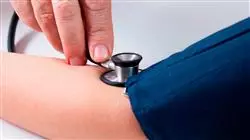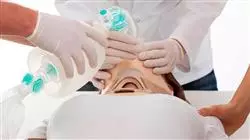University certificate
The world's largest faculty of medicine”
Description
The new scenarios in emergency medicine motivate us to propose new specialization programs that meet the real needs of experienced professionals, so that they can incorporate advances in emergency care into their daily practice”

Emergency health care is an essential element in a health system, in which quality and ongoing care for individuals must be guaranteed. Primary care is the gateway to the health system, often receiving patients with potentially serious conditions that require immediate and complex treatment, often accompanied by minimal resources.
Considering the long hours that primary care physicians spend treating life-threatening emergencies, the importance they have, the current patient and professional demand for greater professional quality, more than justify that primary care physicians today should be able to intervene in all acute and urgent pathologies that may arise regardless of the level of severity. For this reason, the role of family physicians who treat life-threatening emergencies in primary care is crucial.
Being a constantly evolving field, this program includes a series of exclusive Masterclasses in which Jesse M. Pines, M.D. will offer the latest trends and developments in the field of emergency medicine. As an eminent expert in the field of Primary Care Emergency Medicine, Jesse M. Pines, M.D. will provide the specialist with the most important clinical practices and advances in the field.
This program offers rules of action for all possible situations that may be encountered in the practice on a regular basis and will be able to help them make decisions with agility and precision.
Benefit from a series of distinctive Masterclasses that address the latest developments in pharmacology, emergency medicine and advanced cardiovascular support"
This postgraduate diploma in Life-Threatening Emergencies in Primary Care contains the most complete and up-to-date scientific program on the market. The most important features include:
- Clinical cases presented by experts in the different specialties
- The graphic, schematic, and practical contents with which they are created, provide scientific and practical information on the disciplines that are essential for professional practice
- Diagnostic and therapeutic developments in treating patients with urgent pathologies
- Clinical practice guidelines on the different life-threatening pathologies
- Presentation of practical workshops on procedures, diagnosis, and treatment techniques
- An algorithm-based interactive learning system for decision-making in the clinical situations presented throughout the course
- All of this will be complemented by theoretical lessons, questions to the expert, debate forums on controversial topics, and individual reflection assignments
- Content that is accessible from any fixed or portable device with an Internet connection
This postgraduate diploma is the best investment you can make when selecting a refresher program, for two reasons: in addition to updating your knowledge of Life-Threatening Emergencies in Primary Care, you will obtain a qualification from TECH Global University”
The program’s teaching staff includes professionals from the field who contribute their work experience to this educational program, as well as renowned specialists from leading societies and prestigious universities.
The multimedia content, developed with the latest educational technology, will provide the professional with situated and contextual learning, i.e., a simulated environment that will provide immersive education programmed to learn in real situations.
This program is designed around Problem-Based Learning, whereby the professional must try to solve the different professional practice situations that arise during the academic year For this purpose, the students will be assisted by an innovative interactive video system created by renowned and experienced experts.
Increase your decision-making confidence by updating your knowledge with this postgraduate diploma"

Don't miss the opportunity to update your knowledge of Life-Threatening Emergencies in Primary Care tools to increase the quality of patient care"
Objectives
The main program objective is to develop theoretical and practical learning, in order to acquire the necessary skills to establish the appropriate diagnosis and treatment in each case, and to correctly and safely provide medical care to patients with acute pathology in primary care.

This refresher program will generate a sense of confidence in the medical practice of emergency situations in primary care, which will help you grow personally and professionally”
General Objective
- Provide action rules for dealing with the life-threatening emergencies that family physicians must face in their daily clinical practice, helping them to make prompt and accurate decisions
Specific Objectives
Module 1. Organizational Aspects of the Emergency Department
- Define the structure and organization of emergency services in primary care
- Understand the importance of medical records in the emergency department and understand the most relevant legal and ethical aspects of health care in emergencies in primary care
Module 2. Cardiac Emergencies
- Interpret the main signs in order to properly analyze an electrocardiogram in urgent and emergency situations in Primary Care
- Use general procedures and techniques applied to critical patients in emergency situations
- Identify the symptoms of the different types of high-risk syncope
- Define the different conditions that cause chest pain and apply the appropriate protocols in each case
- Apply the specific procedures in Acute Coronary Syndrome and assess the possibility of prehospital fibrinolysis
- Get up-to-date on the therapeutic model in atrial fibrillation according to the latest scientific evidence
- Identify the signs and symptoms of patients who come to the primary care center with pericarditis
- Recognize the different signs and symptoms typical of ischemic heart disease.
Module 3. Advanced Cardiovascular Support and Invasive Techniques in the Emergency Room
- Adequate use of the comprehensive action plan with regard to The Heart Attack Code
- Resolve a hypertensive emergency situation using the updated procedure of care
- Incorporate advances in the appropriate management of patients with Congestive Heart Failure and Acute Pulmonary Edema
- Review the basic concepts of non-invasive mechanical ventilation management
- Correct use of non-invasive mechanical ventilation through the Boussignac CPAP System
- Apply up-to-date basic and advanced CPR techniques for all ages.
- Identify the different vital rhythms to apply the appropriate algorithm for advanced cardiopulmonary resuscitation, according to the latest scientific evidence on advanced cardiovascular support
- Adequately define the different parameters involved in invasive mechanical ventilation
- Master the procedure of pediatric and neonatal cardiopulmonary resuscitation in the primary care setting
- Demonstrate the correct sequence of transcutaneous pacemaker application
Module 4. Respiratory Emergencies
- Incorporate advances in the appropriate management of patients with Congestive Heart Failure and Acute Pulmonary Edema
- Review the basic concepts of non-invasive mechanical ventilation management.
- Correct use of non-invasive mechanical ventilation through the Boussignac CPAP System
- Identify the different vital rhythms to apply the appropriate algorithm for advanced cardiopulmonary resuscitation, according to the latest scientific evidence on advanced cardiovascular support
- Adequately define the different parameters involved in invasive mechanical ventilation
- Get up-to-date on treatment to resolve an acute decompensation in a dyspneic patient
- Recognize the differential diagnosis between the asthmatic patient, bronchospasm, and exacerbation of chronic obstructive pulmonary disease
- Review the pathophysiology involved in an asthmatic crisis
- Use pharmacological treatment measures in pneumonia
- Identify the main clinical signs and symptoms of pneumothorax
- Identify the signs and symptoms of massive pulmonary embolism
- Differentiate the different levels of health care in a patient with hemoptysis and assess the criteria for hospital referral
- Identify the concept of a patient that has almost drowned
- Differentiate the different levels of health care in a patient with hemoptysis and assess the criteria for hospital referral
Module 5. Neurological Emergencies
- Describe the initial management of the main neurological emergencies in out-of-hospital settings
- Adequate use of the comprehensive action plan for the Code Stroke
- Differentiate immediate and appropriate action in acute confusional syndrome, headache and seizures
- Recognize and resolve a seizure situation
- Describe the different types of headaches and the appropriate treatment in each case
- Recognize a coma situation without any doubt
Module 6. Digestive Emergencies
- Identify the signs and symptoms of the main gastrointestinal tract conditions and their repercussions
- Differentiate the main causes of acute abdomen and manage acute abdominal pain in Primary Care
- Review the pathophysiology of an intestinal obstruction process
- Express the different manifestations resulting from biliary diseases
- Recognize the specific pathological picture of upper gastrointestinal bleeding
- Use the different complementary tests to diagnose an ingested foreign body
Module 7. Pharmacology in Emergencies
- Handle drugs frequently used in emergency medicine.
- Distinguish between the different types of fluid therapy
- Point out the different drugs used for sedation, pain relief, and relaxation in emergency medicine

A path to achieve education and professional growth that will propel you towards a greater level of competitiveness in the employment market"
Postgraduate Diploma in Life-Threatening Emergencies in Primary Care
Primary Care is the gateway to the health system, and on many occasions, the patients who come to it have potentially serious processes that require immediate and complex action. In this context, the role of the family doctor who cares for them is key, since they must guarantee quality treatment and continuity in the care that people receive. TECH's Postgraduate Diploma in Vital Emergencies in Primary Care offers you the latest advances in the rules of action for the most frequent Vital Emergencies, thus helping you to make decisions with agility and precision. This degree has been designed by a specialized teaching team that will train you with the latest scientific evidence and clinical cases, in the field of Vital Emergencies in Primary Care.
High-quality content available 100% online
Are you looking to update yourself with the latest care techniques in Vital Emergencies? TECH is for you! With the Postgraduate Diploma in Vital Emergencies in Primary Care, you will be trained in handling emergency situations with maximum efficiency and safety, and you will be prepared to intervene in all emergencies that may arise. With this specialized program, you will be at the forefront of this important medical field.







